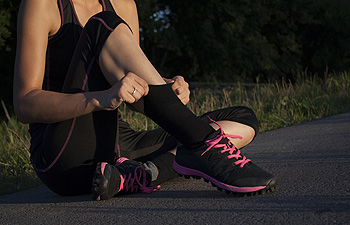283 St Rose Ave
Windsor, ON N8S 1X1
What Kind of Running Shoes Do I Need?
Tuesday, 09 November 2021 00:00There are many running shoes available on the market, and they can usually be classified into five different types of shoes: motion control, stability, cushioned, lightweight, and trail. Motion control running shoes are designed to reduce any excessive rolling in your gait while you run and provide extra shock absorption. These shoes are especially useful for someone with an overpronated gait. Stability running shoes are designed to stop excess motion in the foot and ankle. Cushioned running shoes absorb shock and help protect the feet. Lightweight running shoes are more flexible and can decrease pain and fatigue while running. Trail shoes are designed to help you run on rugged terrain. They are usually more durable and have a better grip than other types of running shoes. To find out which running shoes may be best for you, it is suggested that you consult with a podiatrist.
If you are a runner, wearing the right running shoe is essential. For more information, contact the practitioners from Foot Care Institute. Our practitioners can provide the care you need to keep you pain-free and on your feet.
Choosing the Right Running Shoe for Your Foot Type
To increase performance and avoid the risk of injury, it is important to choose the right running shoe based on your foot type. The general design of running shoes revolves around pronation, which is how the ankle rolls from outside to inside when the foot strikes the ground.
- Neutral runners are able to choose from a wide variety of shoes, including minimalist shoes or even going barefoot.
- Runners who overpronate, or experience an over-abundance of ankle rolling, should choose shoes that provide extra motion control and stability.
- Runners who underpronate, or supinate, have feet that have high arches and lack flexibility, preventing shock absorption. They require shoes with more flexibility and cushion.
If you have any questions please feel free to contact our office located in Windsor, ON . We offer the newest diagnostic and treatment technologies for all your foot and ankle needs.






